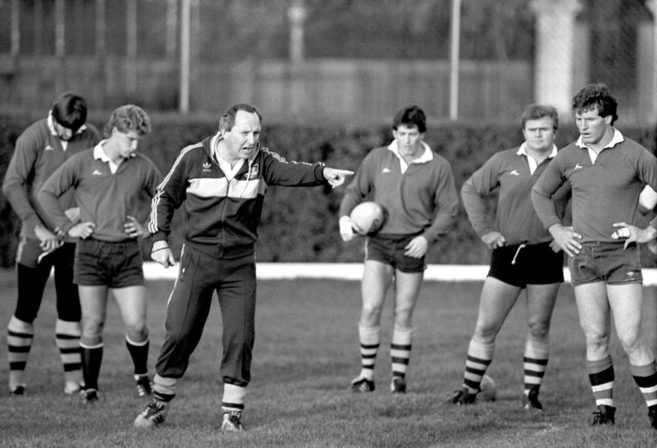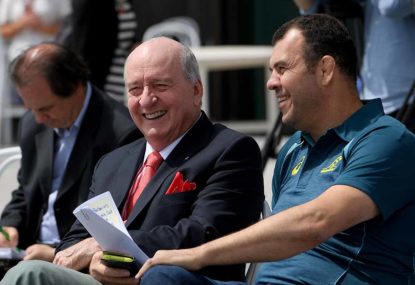The Alan Jones success story started before he was appointed Wallabies coach in 1984.
The 1981-82 Wallaby grand slam tour was a bitter disappointment, beating Ireland 16-12, but losing to Wales 13-18, Scotland 15-24, and England 11-15.
This team should have won the Wallabies’ first slam, but the whole tour was beset by Queensland versus NSW jealousy around the selection table, with Tony Shaw captain and Bob Templeton coach – both Queenslanders.
The worst of the many putrid decisions was playing Queenslander Paul McLean ahead of the clearly superior Mark Ella at fly-half against Ireland and Wales, and when the muck hit the fan and Ella eventually played against Scotland and England, McLean played centre against Scotland instead of Michael Hawker, and fullback against England instead of Roger Gould, who at the time was the best in the world.
But McLean was a dud on that tour as a player, and even more importantly as the number one goal-kicker.
Those Wallabies scored eight tries to three on that tour in the four internationals, but McLean had a mere 30 per cent success rate with the boot, with the worst of them two out of six against Wales, and one from five against England.
Had McLean landed just 60 per cent of his goals, the 81-82 team would have been Australia’s first grand slammers.
So when Alan Jones took over in 1984 that Queensland-NSW jealousy was still evident.
Ella was captain at the time, so to diffuse the interstate jealousy element, Jones made the tough decision to replace Ella with Queenslander Andrew Slack, even though Ella was the clearly superior player – the best in the team.
The move was a masterstroke.
Slack turned out to be an outstanding captain, leading the Wallabies to become the only grand slammers, and win back the Bledisloe Cup.
In fact, Slack was the captain when the Wallabies last won against the All Blacks at Eden Park in 1986, and that was 17 Tests ago.
Ella retired after the slam tour at 25 with just 25 caps, a terrible waste of talent.
But during Slack’s captaincy, mercurial Mark, the greatest number 10 I’ve ever seen, played the best rugby of his exciting career, culminating with a try in all four of those slam internationals – a fitting finale.
For the record, Ella was captain for ten of his 25 caps with four wins. Slack led the side for 19 of his 39 caps for 14 wins, a success rate almost twice as good as Ella’s.
Alan Jones proved his point.

(Photo by S&G/PA Images via Getty Images)
Michael Cheika is faced with a similar decision, even though there’s no interstate jealously involved of any description.
David Pocock was Wallaby captain when he suffered two knee reconstructions in as many seasons in 2013 and 2014.
He was one of the two best open-side flankers in world rugby at the time with Richie McCaw, but for two years he never played a Test. In fact, he hardly played a game as both severe injuries were early in the season.
That gave Michael Hooper his chance, and he grabbed it.
But it would be fair, and accurate, to say had Pocock never been injured, Hooper would only have appeared off the bench, at best.
But since they were both available, the “Pooper” experiment has surfaced with Pocock forced to play number 8 to accommodate Hooper, who is too small for 6 or 8.
So the best 7 in Pocock has to play out of position, and to magnify the dilemma Pocock is the best captain, but he’s playing under Hooper’s leadership.
Unlike Alan Jones, who had to back his own instinct, Michael Cheika has both the captaincy records of Pocock and Hooper at his fingertips.
Pocock won four of his six Tests as captain before he was twice injured for a 66.67 per cent success – Hooper 12 wins from 30 for 45 per cent.
There’s no debate, the decision is obvious.






























































































